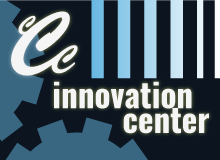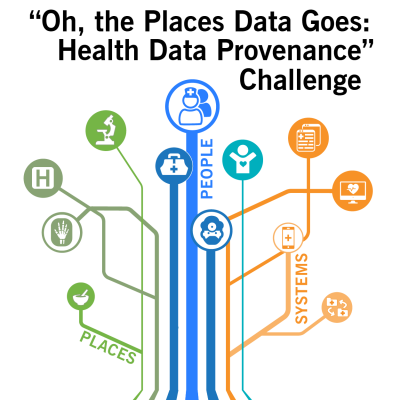Oh, the Places Data Goes: Health Data Provenance Challenge
Challenge Description
As the movement of health information increases among consumers and providers, so does the need to track data provenance with each information update and/or exchange event. According to W3C, “provenance is information about entities, activities, and people involved in producing a piece of data or thing, which can be used to form assessments about its quality, reliability or trustworthiness.” The requirements for data provenance information must support the full lifecycle and lifespan of health data. Confidence in the authenticity, trustworthiness, and reliability of the health data being moved is fundamental to patient safety as well as secure health information exchange.
As health information exchange becomes more widespread and patient generated health data more commonplace, industry stakeholders will increasingly depend on understanding (for example):
- Who created the original health information?
- Where was the original health information created?
- When was the original health information created?
- What information has been changed?
- Why has the information been changed?
Notably, standards development in this area continues to progress. Several standards activities help frame “record lifecycle events,” which represent key points at which audit or provenance data should or could be applied. Such standards include, but are not limited to:
- The electronic health record system functional model (EHR-S FM).
- The HL7 Fast Healthcare Interoperability Resources (FHIR®) EHR-S Record Lifecycle Event Implementation Guide (RLE IG) for FHIR’s second and third trial use releases.
An update to the International Organization for Standardization (ISO) Technical Specification 21089: Trusted End-to-End Information Flows, from its (year) 2004 version.
PRIZES
- Phase 1: Up to 4 winners, each awarded a cash prize of $20,000
- Phase 2: 1st place winner will be awarded a cash prize of $60,000.
2nd place winner will be awarded a cash prize of $40,000; - Total: Up to $180,000 in prizes
Challenge Timeline
PHASE 1:
- Submission Period: April 6 – May 22, 2017 (by 11:59 EST)
- Winners Notified: June 12, 2017 (by 11:59 EST)
- Winners Announced: June 13, 2017 (by 11:59 EST)
PHASE 2:
- Submission Period: June 14, 2017 – January 22, 2018 (by 11:59 EST)
- Winners Notified: February 20, 2018 (by 11:59 EST)
- Winners Announced: February 21, 2018 (by 11:59 EST)
Challenge Requirements
The challenge has two phases. It will end with the selection of first and second place winners.
General Submission Requirements
In order for a submission to be eligible to win this Challenge, it must meet the following requirements:
- No HHS or ONC logo – The product must not use HHS’ or ONC’s logos or official seals and must not claim endorsement.
- Functionality/Accuracy – A product may be disqualified if it fails to function as expressed in the description provided by the Submitter, or if it provides inaccurate or incomplete information.
- Security – Submissions must be free of malware. Submitter agrees that ONC may conduct testing on the product to determine whether malware or other security threats may be present. ONC may disqualify the submission if, in ONC’s judgment, it may damage government or others’ equipment or operating environment.
Phase 1: White Paper Proposals
For Phase 1, teams must submit white papers that describe their current capabilities and methods used to demonstrate provenance of health data. Teams must also identify a problem they experience that inhibits the desired/necessary amount of provenance data to be conveyed during clinical care and propose a solution. Participants are expected to articulate the technical, operational, and business aspects/impacts of their problem and solution, including but not limited to, the value proposition, key partners, implementation plan, timeline, key activities and resources, and metrics for success. The goal of Phase 1 is for teams to identify “real world” provenance problems, understand why they are important to solve, and provide an opportunity for participants to develop practical and executable plans for innovative solutions.
Up to 4 winners will each receive a $20,000 award and advance to Phase 2 of the challenge.
Phase 1 Submission Requirements:
- Submit by the deadline of May 22, 2017 by 11:59 EST using the online platform.
- 15-page maximum, size 12 pt. font; in English and pdf format
- Include general information about the applicant, team members, and organization.
- Describe current capabilities/methods used by participating team/organization for conveying provenance, limitations, and areas that would be improved as part of participating in the challenge.
- Provide a Business Case for the proposed solution
- Identify unique issues/challenges faced when trying to convey provenance
- Include an executive summary stating the value proposition
- Discuss the anticipated value implementing the proposed solution would provide your organization. This discussion may include information regarding meeting health IT standards, implementation and potential performance issues, and cost implications. Risk analysis and mitigation would be appropriate to include here as well.
- Describe the methods and technologies used to develop the solution
- Provide a financial overview that includes cost structure, projected revenue and expense budget, current funders and description of how funds will be used/allocated
- General project information
- Project plan for implementing Phase 2, if selected, including a 6 month milestone timeline
- Include metrics for success (e.g., number of users of technology, money saved by using technology, time saved) and any additional metrics
- Identify your team lead (or key team members) and describe the overall team roles, responsibilities, and capabilities
Phase 2: Prototype & Pilot
Only Phase 1 winners will be eligible to participate in the second and final phase, which involves the development and testing of their solution to the problem identified in Phase 1. As a condition of accepting the $20,000 award, Phase 1 winners must participate in Phase 2 of the challenge. Participants will submit a recorded demonstration, solution guide and lessons learned focused on prototyping and testing the effectiveness of the solution. The goal of Phase 2 is to demonstrate a viable solution with high technological merit, test the scalability, the feasibility of implementation, and the impact of the intended outcomes. Any modifications to Phase 1 submission, including but not limited to changes in team members, proposed concepts and/or other Phase 1 requirements may result in disqualification at the sole discretion of ONC.
The first place winner will win $60,000; a second place winner will win $40,000.
Phase 2 Submission Requirements:
- Submit by the deadline of January 22, 2018 by 11:59 EST.
- Submissions should be in pdf format
- Include a Solution Guide that describes key activities and resources required
- Provide a Video (e.g., YouTube or Vimeo) demonstration of the technology and test results
- Test the technology using test data
- Demonstrate the capability to go live, scalability, and an interface optimized for consumers and/or providers
- Report on milestones and deliverables specified in Phase 1 application
- Demonstrate achievement of plan set forth in the business proposal
- Describe lessons learned
- Provide concrete next steps that could be taken to scale the solution’s use
Prizes
- Phase 1: Up to 4 winners, each awarded a cash prize of $20,000
- Phase 2: 1st place winner will be awarded a cash prize of $60,000.
2nd place winner will be awarded a cash prize of $40,000;
- Total: Up to $180,000 in prizes
Payment of the Prize:
- Prize will be paid by Capital Consulting Corporation, the contractor.
How to Enter
Challenge participants will submit their entries via the Submission form accessed here.
Participants can register anytime during the proposal submission period. Follow the Submission Requirements listed on this site.
Evaluation Criteria
Eligible challenge entries will be judged by a review panel composed of federal employees and experts in compliance with the requirements of the America COMPETES Act and the Department of Health and Human Services judging guidelines: http://www.hhs.gov/idealab/wp-content/uploads/2014/04/HHS-COMPETITION-JUDGING-GUIDELINES.pdf. The review panel will make selections based upon the criteria outlined below.
Phase 1
IMPACT TO INDUSTRY IF THE PROBLEM ADDRESSED WAS RESOLVED (20%)
- Does the applicant present a theory or explanation of how the proposed technology would improve the future of health data provenance?
- Does the applicant describe how the solution could be optimized for the greater population?
TECHNICAL COMPETENCE AND CAPABILITIES OF THE PROPOSED TEAM (40%)
- Is there appropriate expertise and capability to bring the idea to the testing stage?
- Do the team members have the resources available to carry out proposed work?
EXECUTABILITY (20%)
- Does the entry demonstrate a reasonable and credible approach to accomplish the proposed objectives, tasks, outcomes, and deliverable?
- Does the entry clearly define potential risks?
- Does the entry include a thorough description for the use of funds?
CREATIVITY/INNOVATION (20%)
Phase 2
EXECUTION AND PROBLEM SOLVING (15%)
- Execution timeline and milestones were met.
- How does the solution’s implementation compare to the team’s set of success metrics?
- Does the solution solve the problem identified in Phase 1?
VIABILITY (25%)
- Does the entry present a deep understanding of the market for the solution?
- Is there a clear advantage that differentiates this solution from others?
- Is the model implementable in other organizations?
IMPACT (30%)
- Do pilot results demonstrate impact?
- Do the results indicate how the solution will enable users to successfully check the provenance of data in “real world” scenarios?
SCALABILITY (30%)
- How scalable is the technology in a real-world setting?
- How likely are cost efficiencies for delivery at greater scale?
- Is the user experience optimized for the greater population of consumers and/or providers?
- Is the solution easy to manage (ease of use, ease of data movement, user friendly)?
Additional Information
General Conditions: ONC reserves the right to cancel, suspend, and/or modify the Contest, or any part of it, for any reason, at ONC’s sole discretion.
Intellectual Property: Each entrant retains title and full ownership in and to their submission. Entrants expressly reserve all intellectual property rights not expressly granted under the challenge agreement. By participating in the challenge, each entrant hereby irrevocably grants to ONC a limited, non-exclusive, royalty-free, worldwide license and right to reproduce, publically perform, publically display, and use the Submission to the extent necessary to administer the challenge, and to publically perform and publically display the Submission, including, without limitation, for advertising and promotional purposes relating to the challenge.
Representation, Warranties and Indemnification
By entering the Challenge, each applicant represents, warrants and covenants as follows:
- Applicant is the sole author, creator, and owner of the Submission;
- The Submission is not the subject of any actual or threatened litigation or claim;
- The Submission does not and will not violate or infringe upon the intellectual property rights, privacy rights, publicity rights, or other legal rights of any third party; and
- The Submission, and Applicants’ use of the Submission, does not and will not violate any applicable laws or regulations, including, without limitation, applicable export control laws and regulations of the U.S. and other jurisdictions.
If the Submission includes any third party works (such as third party content), Applicant must be able to provide, upon request, documentation of all appropriate licenses and releases for such third party works. If Applicant cannot provide documentation of all required licenses and releases, Federal Agency sponsors reserve the right, at their sole discretion, to disqualify the applicable Submission. Applicants must indemnify, defend, and hold harmless the Federal Government from and against all third party claims, actions, or proceedings of any kind and from any and all damages, liabilities, costs, and expenses relating to or arising from Applicant’s Submission or any breach or alleged breach of any of the representations, warranties, and covenants of Applicant hereunder. The Federal Agency sponsors reserve the right to disqualify any Submission that, in their discretion, deems to violate these Official Rules, Terms & Conditions.


